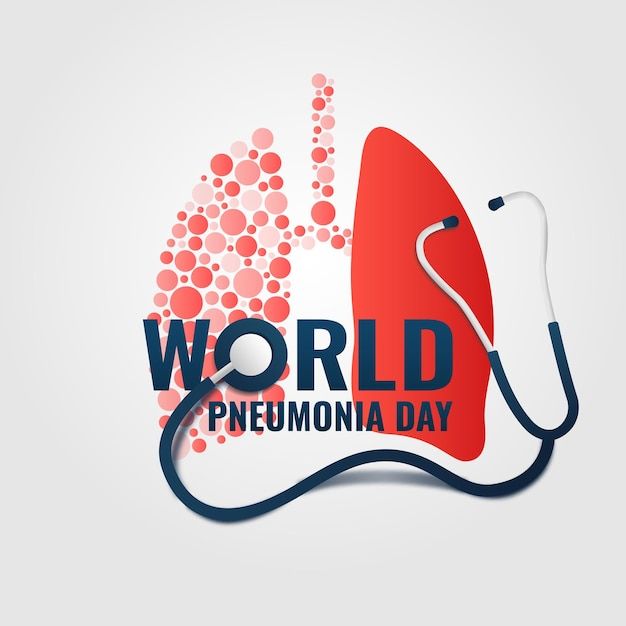“5 Powerful Ways World Pneumonia Day Saves Lives and Raises Awareness”
What is World Pneumonia Day?
World Pneumonia Day is observed every year on November 12th and is an international day aimed at raising awareness about pneumonia, a leading cause of death worldwide, particularly among children under the age of five. Pneumonia is an infection that inflames the air sacs in one or both lungs, leading to symptoms such as cough, fever, shortness of breath, and chest pain.
The day was first established in 2009 by the Global Coalition Against Child Pneumonia, and it aims to highlight the global burden of pneumonia, its preventability, and the need for action to reduce its impact. The goal is to raise awareness about pneumonia and to encourage individuals, communities, and governments to take preventive actions to fight this disease.
History of World Pneumonia Day
World Pneumonia Day was established in 2009 following an initiative by the Global Coalition Against Child Pneumonia (a coalition of organizations including the World Health Organization (WHO) and UNICEF). The idea behind the observance was to shed light on the ongoing health issue of pneumonia, which was often overlooked in global health discussions despite being one of the leading causes of death among young children.
While pneumonia is treatable and preventable, it still accounts for more deaths than other diseases, including diarrhea and malaria, combined. In fact, pneumonia claims the lives of more than 800,000 children under the age of five each year. The establishment of World Pneumonia Day was therefore a vital step in drawing attention to this global health issue and galvanizing efforts to improve prevention, diagnosis, and treatment.
Significance of World Pneumonia Day
World Pneumonia Day plays a significant role in the global fight against pneumonia, and its observance brings attention to several important issues:
- Raising Awareness: Pneumonia is often perceived as a manageable disease, but its impact is still vast, especially in developing countries. It is vital to raise awareness about the fact that pneumonia is preventable and treatable, and that education and access to healthcare can save countless lives.
- Promoting Vaccination: One of the most effective ways to prevent pneumonia is through vaccination. Vaccines such as the pneumococcal vaccine and the Hib vaccine (for Haemophilus influenza type b) are essential in preventing the most common causes of bacterial pneumonia in children. World Pneumonia Day serves as an opportunity to encourage global immunization efforts, particularly in vulnerable populations.
- Advocating for Improved Healthcare Access: Pneumonia is treatable with proper medical care, but millions of people around the world still lack access to the necessary treatment. World Pneumonia Day advocates for better healthcare infrastructure, particularly in rural and low-income areas, to ensure that everyone can receive timely treatment.
- Calling for Better Nutrition: Malnutrition, particularly a lack of essential vitamins and minerals, weakens the immune system and makes people more susceptible to pneumonia. World Pneumonia Day highlights the importance of good nutrition, including breastfeeding, which can reduce the risk of pneumonia in infants.
- Fostering Global Collaboration: Pneumonia is a disease that transcends borders. World Pneumonia Day encourages countries, organizations, and communities to work together to reduce the burden of pneumonia through better research, public health initiatives, and shared resources.
Key Facts About Pneumonia
- Leading Cause of Death: Pneumonia is one of the top five causes of death worldwide, especially among children under five and elderly adults.
- Global Burden: Pneumonia claims the lives of over 2.5 million people annually, and 1 in 5 child deaths is caused by pneumonia.
- Risk Factors: Factors such as malnutrition, lack of access to healthcare, poor sanitation, and environmental pollution increase the risk of contracting pneumonia.
- Pneumonia and Vaccination: Vaccination plays a critical role in preventing pneumonia, with vaccines such as the pneumococcal vaccine and Haemophilus influenza type b (Hib) vaccine being essential in reducing the incidence of bacterial pneumonia.
- Treatment of Pneumonia: Pneumonia can be treated with antibiotics if caused by bacteria. Early diagnosis and access to healthcare can significantly improve survival rates.
Observance of World Pneumonia Day
World Pneumonia Day is observed through a variety of activities and initiatives globally. Here are some common ways in which people and organizations observe this important day:
- Educational Campaigns: Health organizations, schools, and communities organize events to educate the public about the dangers of pneumonia, its prevention, and how it can be treated. These campaigns often focus on raising awareness of vaccination programs.
- Health Screenings: Medical professionals may conduct free health checkups, particularly in vulnerable communities, to identify people at risk for pneumonia and provide timely treatment.
- Social Media Campaigns: Organizations and individuals use social media platforms to share facts, statistics, and personal stories to spread awareness. Hashtags like #WorldPneumoniaDay help bring attention to the cause and encourage people to take action.
- Advocacy and Fundraising: World Pneumonia Day is also a time to raise funds for research and programs that aim to improve pneumonia prevention and treatment, particularly in under-resourced regions.
- Community Outreach: In many parts of the world, non-governmental organizations (NGOs) and healthcare organizations collaborate with local governments to distribute vaccines, provide essential medical supplies, and promote awareness in rural areas.
Impact of World Pneumonia Day on Daily Life
World Pneumonia Day has a direct impact on daily life, particularly in vulnerable communities:
- Increased Awareness: As more people become aware of pneumonia’s risks and prevention methods, they are better able to take proactive measures, such as getting vaccinated or seeking medical care when symptoms arise.
- Better Healthcare Access: Countries that observe World Pneumonia Day may allocate more resources to address healthcare infrastructure gaps, ensuring that even remote populations receive the necessary care.
- Enhanced Vaccination Programs: With the spotlight on pneumonia, more children receive vaccines to protect against the disease, reducing the global incidence of pneumonia.
- Community Support: World Pneumonia Day fosters a sense of community among individuals affected by pneumonia and those working to reduce its prevalence, offering hope and solidarity.
Frequently Asked Questions (FAQs)
1. What is World Pneumonia Day?
World Pneumonia Day is an observance aimed at raising awareness about pneumonia, its preventability, and the importance of timely treatment. It is celebrated on November 12th each year.
2. Why is pneumonia so deadly?
Pneumonia is deadly because it can progress quickly, especially in children, the elderly, and those with weakened immune systems. If left untreated, it can cause complications such as sepsis and respiratory failure.
3. How can pneumonia be prevented?
Pneumonia can be prevented through vaccination, good hygiene practices, proper nutrition, and access to quality healthcare.
4. Who is most at risk for pneumonia?
Young children, the elderly, people with chronic illnesses, and those with weakened immune systems are most at risk for pneumonia.
5. What are the symptoms of pneumonia?
Symptoms include fever, cough, shortness of breath, chest pain, and fatigue. If these symptoms are present, it’s important to seek medical attention immediately.
Wishing on World Pneumonia Day
On this World Pneumonia Day, let us unite in raising awareness and combating this deadly disease. May we continue to work together to ensure that pneumonia is prevented, treated, and eliminated as a global health threat. Here’s to a future where fewer lives are lost to pneumonia, and where every child, woman, and man can thrive in good health.
Why World Pneumonia Day Matters to Society
World Pneumonia Day is essential for raising awareness about a disease that claims millions of lives annually. By spreading knowledge, encouraging vaccination, and advocating for better healthcare access, this day plays a critical role in preventing unnecessary deaths. Society as a whole benefits when we work together to reduce the impact of pneumonia, saving lives and ensuring a healthier future for everyone.










